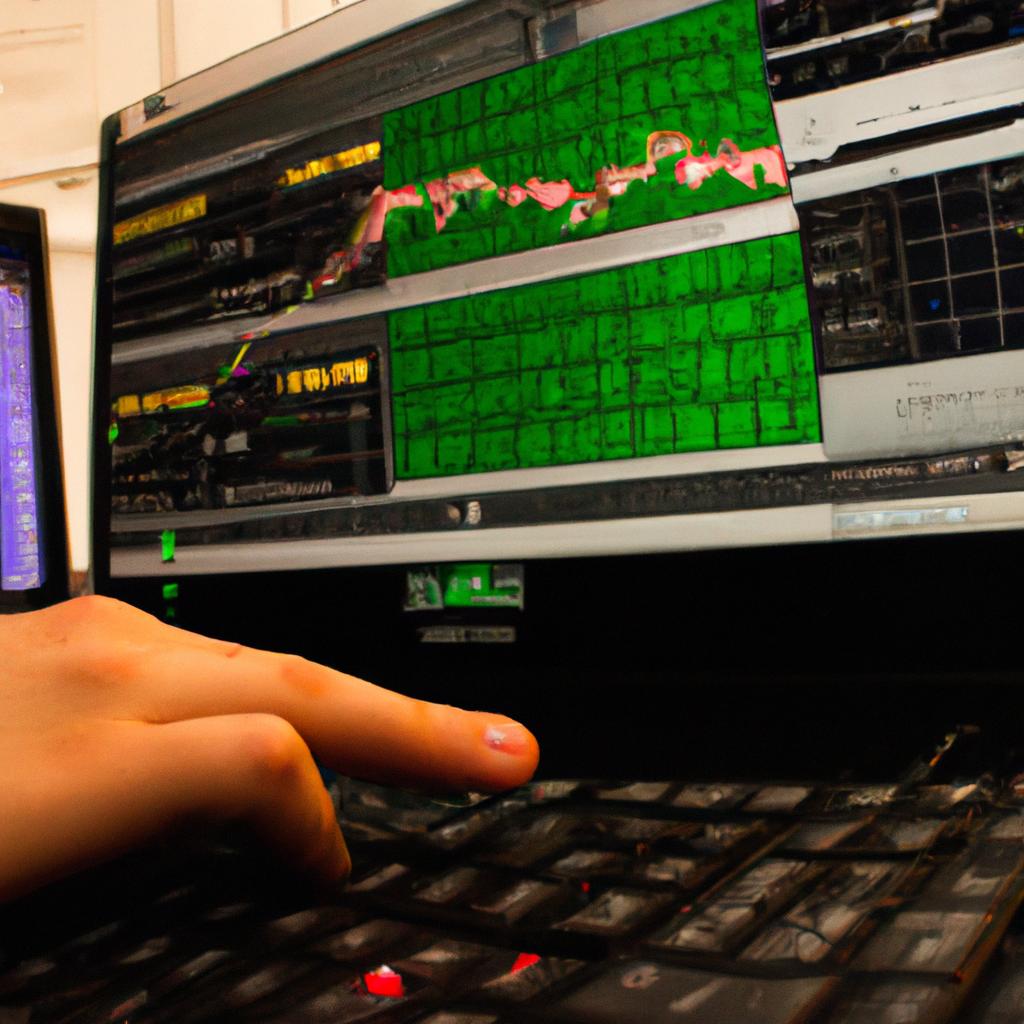Market dynamics in online games have become increasingly complex and intriguing, particularly within the context of virtual economies. The emergence of these digital marketplaces has revolutionized the gaming industry, creating a new dimension where players can engage in economic activities that mirror real-world markets. For instance, consider the popular multiplayer game “World of Warcraft,” which features an immersive virtual world with its own economy. Players can buy and sell various items such as weapons, armor, and resources through an auction house system, allowing them to accumulate wealth and enhance their gameplay experience.
This article aims to explore the intricacies of market dynamics in online games by examining how virtual economies function and evolve over time. By delving into this subject matter, we can gain valuable insights into the factors that influence supply and demand within these digital ecosystems. Moreover, analyzing the behavior of players as consumers and producers within these virtual markets provides us with a deeper understanding of human decision-making processes when faced with scarcity and competition. Through a combination of theoretical frameworks and empirical evidence from existing studies, we seek to unravel the complexities behind these fascinating phenomena.
Overview of Online Game Market
Overview of Online Game Market
The online gaming industry has witnessed remarkable growth in recent years, driven by advancements in technology and the increasing popularity of digital entertainment. One prominent example that exemplifies this market trend is the widely played online game “World of Warcraft” developed by Blizzard Entertainment. With millions of players worldwide, “World of Warcraft” has not only revolutionized the gaming experience but also proven to be a lucrative venture for its developers.
Understanding the dynamics of the online game market requires an examination of various factors that contribute to its ongoing success. Firstly, the accessibility and convenience offered by online games have significantly contributed to their widespread adoption. Unlike traditional console or PC games, which require specific hardware and software installations, online games can be accessed through multiple platforms such as computers, smartphones, and tablets. This flexibility allows gamers to engage with their favorite titles anytime and anywhere, making them more appealing to a broader audience.
Secondly, virtual economies within online games have emerged as integral components driving player engagement and monetization strategies. These virtual economies operate similarly to real-world marketplaces where players can trade virtual goods or currencies using in-game resources. The existence of these dynamic virtual markets creates opportunities for resource allocation optimization and strategic decision-making within gameplay scenarios.
To illustrate the impact of virtual economies on player experiences, consider the following bullet points:
- Economic Interactions: Players actively participate in buying, selling, and trading items within the game’s economy.
- Inflationary Pressures: Virtual currency fluctuations influence pricing mechanisms and create economic imbalances.
- Trading Strategies: Gamers develop trading skills to maximize profits from transactions.
- Social Dynamics: Economic interactions foster social connections among players who form alliances or rivalries based on financial exchanges.
Furthermore, analyzing the characteristics of these virtual economies requires examining different aspects such as supply-demand dynamics, price elasticity, scarcity of resources, and regulatory frameworks governing these digital ecosystems. To provide a comprehensive understanding, the following table showcases key elements influencing virtual economies in online games:
| Key Elements | Description |
|---|---|
| Supply-Demand Dynamics | The balance between availability and demand for virtual goods or currencies. |
| Price Elasticity | Sensitivity of prices to changes in supply and demand within the game’s economy. |
| Scarcity of Resources | Limited availability of valuable items or resources, driving their market value. |
| Regulatory Frameworks | Rules and policies implemented by game developers to regulate economic interactions. |
Understanding the impact of market dynamics on online games goes beyond monetary transactions alone. It encompasses a complex web of factors that shape player experiences, influence decision-making processes, and foster social interactions within these digital ecosystems. In the subsequent section, we delve deeper into exploring the multifaceted effects brought about by market dynamics in online gaming environments.
Transition Sentence: With an overview of the online game market established, it is crucial to understand how these market dynamics influence various aspects of gameplay and player engagement without losing sight of its broader implications.
Understanding the Impact of Market Dynamics
In the rapidly evolving landscape of online games, understanding the impact of market dynamics is crucial for both game developers and players. These dynamics encompass a range of factors that shape the virtual economies within these games, influencing player behavior and shaping the overall gaming experience.
To illustrate this point, let’s consider a hypothetical example: “Game X,” a massively multiplayer online role-playing game (MMORPG) that has recently introduced an in-game marketplace where players can buy and sell virtual items using real money. This addition to Game X’s ecosystem has significant implications for its market dynamics.
One key aspect of market dynamics in online games is supply and demand. The introduction of the in-game marketplace in Game X creates opportunities for players to obtain rare or valuable items through various means such as quests or defeating powerful enemies. As more players acquire these coveted items, their scarcity decreases, potentially affecting their perceived value and subsequently impacting prices within the marketplace.
Market competition also plays a vital role in shaping market dynamics. In Game X’s case, with the ability to buy and sell virtual items using real money, players may engage in speculative trading practices to profit from fluctuations in item prices. This speculation further intensifies competition within the marketplace, driving up prices during periods of high demand or limited availability.
Furthermore, external events can significantly influence market dynamics in online games. For instance, if Game X introduces a limited-time event where unique rewards are offered exclusively through participation, it could create a surge in demand for specific items associated with that event. This sudden increase in demand may result in skyrocketing prices as players scramble to secure these sought-after rewards before time runs out.
These examples highlight just a few aspects of how market dynamics impact online game environments. To provide further insight into this subject matter, we present below a bullet-point list summarizing key emotional responses evoked by market dynamics:
- Excitement over obtaining rare and valuable items
- Frustration when facing fierce competition and high prices
- Anticipation for limited-time events and exclusive rewards
- Disappointment if unable to secure desired items due to market dynamics
To delve deeper into the various elements that influence online game markets, we will now explore key factors shaping these dynamics in the subsequent section.
| Key Emotional Responses |
|---|
| Excitement |
| Frustration |
| Anticipation |
| Disappointment |
In conclusion, understanding the impact of market dynamics is crucial within the context of virtual economies in online games. Supply and demand, market competition, and external events all contribute to shaping these dynamics. Players experience a range of emotional responses as they navigate through these ever-changing environments. In the following section, we will examine the key factors influencing online game markets without delay.
Key Factors Influencing Online Game Markets
The impact of market dynamics on online game markets is a crucial area of study, as it provides insights into how virtual economies function and evolve. By examining various factors that shape these markets, researchers can gain valuable knowledge about their intricacies and make predictions regarding future trends. One example that highlights the significance of market dynamics in online games is the rise and fall of a popular multiplayer role-playing game (MMORPG) called “Worlds Apart.”
“Worlds Apart” was initially launched with great anticipation and quickly gained a large player base due to its immersive gameplay experience and captivating storyline. However, over time, changes in market dynamics led to a decline in its popularity. This decline can be attributed to several key factors:
-
Competition: The introduction of new MMORPGs offering unique features and improved graphics created competition for “Worlds Apart.” Players were drawn towards other games that provided fresh experiences, leading to a gradual loss of interest in “Worlds Apart.”
-
Inflation: Within the virtual economy of “Worlds Apart,” inflation played a significant role in shaping market dynamics. As more players accumulated wealth within the game, prices for desirable items skyrocketed, making it difficult for newcomers or less affluent players to participate fully.
-
Player Feedback: A lack of responsiveness to player feedback by the developers contributed to dissatisfaction among the gaming community. Issues such as unbalanced gameplay mechanics and slow bug fixes resulted in frustration and ultimately decreased engagement.
-
Technological Advancements: Advances in technology allowed for the creation of more visually stunning games with enhanced features. As players became accustomed to higher-quality graphics and smoother gameplay mechanics, older games like “Worlds Apart” struggled to keep up with evolving player expectations.
To illustrate these factors further, consider Table 1 below which demonstrates how each factor impacted the success or failure of “Worlds Apart”:
Table 1: Factors Influencing Success of “Worlds Apart”
| Factors | Impact on “Worlds Apart” |
|---|---|
| Competition | Decreased popularity |
| Inflation | Economic disparity |
| Player Feedback | Diminished satisfaction |
| Technological Advancements | Outdated graphics and features |
Understanding the impact of market dynamics is crucial for game developers, as it enables them to adapt their strategies accordingly. By recognizing factors that influence online game markets, they can make informed decisions about updates, pricing models, and player engagement initiatives.
Understanding how players interact with virtual economies and respond to various stimuli is essential for designing engaging gameplay experiences.
[Transition Sentence] As we move forward, let us explore the fascinating world of player behavior in online games.Exploring Player Behavior in Online Games
The success of online games is not solely determined by their gameplay mechanics or visual aesthetics, but also heavily influenced by the behavior of players within these virtual worlds. Understanding player behavior can provide valuable insights into how to design and manage online game markets effectively. To illustrate this point, let us consider a hypothetical example involving an MMORPG (Massively Multiplayer Online Role-Playing Game) called “FantasyRealm.”
One key aspect that influences player behavior in online games is the concept of social interaction. Players often form communities, guilds, or alliances within the game, which fosters collaboration and competition. These interactions create a sense of belonging and camaraderie among players, enhancing their overall gaming experience. Additionally, social connections can influence purchasing decisions as players may be more inclined to invest time and money into a game if they have friends playing alongside them.
Another factor that affects player behavior is the presence of virtual economies within online games. Virtual currencies and in-game items hold significant value for players and can drive certain behaviors such as trading, hoarding, or even engaging in illicit activities like gold farming or item duplication. The allure of acquiring rare or powerful items motivates players to participate actively in various economic activities within the game world.
Furthermore, psychological factors play a crucial role in shaping player behavior. For instance, the fear-of-missing-out (FOMO) phenomenon drives some individuals to engage in excessive grinding or spending real money on microtransactions to obtain exclusive items before they become unavailable. Additionally, the element of risk-taking provides excitement and thrill to players who are willing to take chances on high-risk/high-reward opportunities within the game’s economy.
To emphasize the significance of player behavior in online games further, here is a bullet-point list highlighting its impact:
- Social dynamics shape player engagement and retention.
- Virtual economies drive economic activities and motivate player participation.
- Psychological factors, such as FOMO and risk-taking, influence player decision-making.
- In-game behavior often mirrors real-life social and economic behaviors.
To provide a comprehensive overview of player behavior in online games, the following table presents key characteristics observed in different types of players:
| Player Type | Characteristics | Motivations |
|---|---|---|
| Casual Players | Play for leisure | Relaxation and entertainment |
| Hardcore Gamers | Dedicated and highly skilled | Competition and achievement |
| Socializers | Thrive on community | Building relationships |
| Achievers | Goal-oriented | Unlocking achievements |
As we delve further into this topic, it becomes evident that analyzing player behavior is crucial for understanding online game markets. By examining how players interact within these virtual worlds, developers can tailor their strategies to cater to the needs and preferences of their target audience. This knowledge will serve as a foundation for the subsequent section discussing “Analyzing In-game Transactions and Trading.”
With an understanding of player behavior established, let us now turn our attention to the analysis of in-game transactions and trading.
Analyzing In-game Transactions and Trading
Exploring Player Behavior in Online Games has provided valuable insights into the motivations and actions of players within virtual environments. Building upon this understanding, it is crucial to delve further into the realm of in-game transactions and trading to comprehensively analyze market dynamics in online games.
To illustrate the significance of these dynamics, let’s consider a hypothetical scenario involving an immensely popular massively multiplayer online role-playing game (MMORPG) called “Fantasy World.” In Fantasy World, players have the ability to purchase virtual items such as weapons, armor, and cosmetic enhancements from an in-game marketplace using either real-world currency or in-game resources earned through gameplay achievements.
Understanding the complexities of player behavior and economic interactions within the context of virtual economies requires a multidimensional approach. Here are some key aspects to consider:
-
Supply and demand: Like any market, virtual economies are driven by supply and demand forces. The availability and desirability of certain items influence their prices. For example, rare items with powerful attributes tend to be highly sought after, leading to increased demand and higher prices.
-
Economic stability: Just like real-world economies, maintaining a stable economy within an online game is vital for its sustained success. Rapid inflation or deflation can disrupt the balance between item values and player earnings, potentially causing discontent among players.
-
Market manipulation: Due to the potential profitability associated with virtual goods trading, there may be instances of market manipulation by certain individuals or groups seeking personal gain. This could involve artificially inflating or crashing prices through various means such as hoarding or dumping specific items onto the market.
-
Ethical considerations: Virtual economies raise ethical questions regarding fair play and exploitative practices. Some players resort to purchasing virtual currency or items from third-party websites using real money, infringing on the intended progression system established by developers.
By analyzing these facets of market dynamics in online games, researchers can devise strategies for managing them effectively while fostering a healthy and balanced virtual economy. In the subsequent section, we will explore potential approaches to address challenges associated with market dynamics in online games.
Transitioning into the next section about “Strategies for Managing Market Dynamics in Online Games,” it is essential to develop mechanisms that promote fairness, stability, and player satisfaction within these virtual economies.
Strategies for Managing Market Dynamics in Online Games
In the previous section, we delved into the intricacies of in-game transactions and trading within virtual economies. Now, let us explore strategies that can be employed to effectively manage the dynamic nature of these markets.
One example that showcases the complexities of market dynamics in online games is the phenomenon of ‘price manipulation’. Players with extensive knowledge of market trends and high-value items often engage in tactics to artificially inflate or deflate prices for their own gain. For instance, a player may purchase a rare item at a low price and then create artificial scarcity by withholding it from the market. Subsequently, they can sell this item at an inflated value once demand increases among other players seeking exclusivity. Such practices not only disrupt the equilibrium of the virtual economy but also impact player experiences.
To address these challenges, developers and game operators can employ various strategies:
- Implementing regulatory measures: By establishing policies against price manipulation and implementing mechanisms to detect suspicious activities, developers can discourage unfair practices.
- Creating balanced reward systems: Designing gameplay mechanics that reward skillful play rather than solely relying on purchasing power helps maintain a level playing field for all players.
- Encouraging community engagement: Fostering active communication channels between players enables them to share information about fluctuating market conditions, reducing information asymmetry and promoting fair competition.
- Regular monitoring and adaptation: Developers should continuously monitor market trends and adapt their strategies accordingly. This includes revisiting pricing algorithms, adjusting drop rates for valuable items, or introducing new content to diversify trade opportunities.
Table 1 – Market Dynamics Strategies Comparison
| Strategy | Advantages | Disadvantages |
|---|---|---|
| Regulatory measures | Deters price manipulation | Requires ongoing enforcement |
| Balanced reward systems | Promotes fair competition | May require frequent rebalancing |
| Community engagement | Reduces information asymmetry | Requires active moderation and management |
| Regular monitoring and adaptation | Allows for market responsiveness | Requires constant updates and adjustments |
By employing these strategies, developers can mitigate the negative impact of price manipulation and other market irregularities in online games. This not only enhances the overall player experience but also contributes to a more stable virtual economy.
In summary, understanding market dynamics within virtual economies is crucial for maintaining balance and fairness. By implementing regulatory measures, fostering community engagement, designing balanced reward systems, and regularly adapting to changing conditions, game operators can effectively manage market dynamics in online games. Through such efforts, players will be able to engage in fair trading practices, contributing to a thriving gaming ecosystem.
 FSC Clan
FSC Clan



